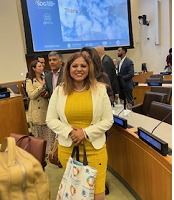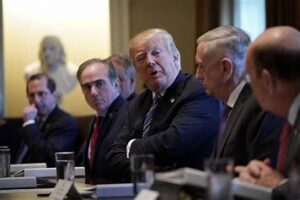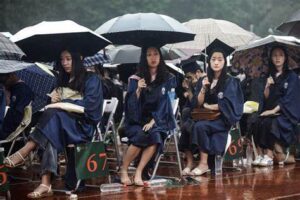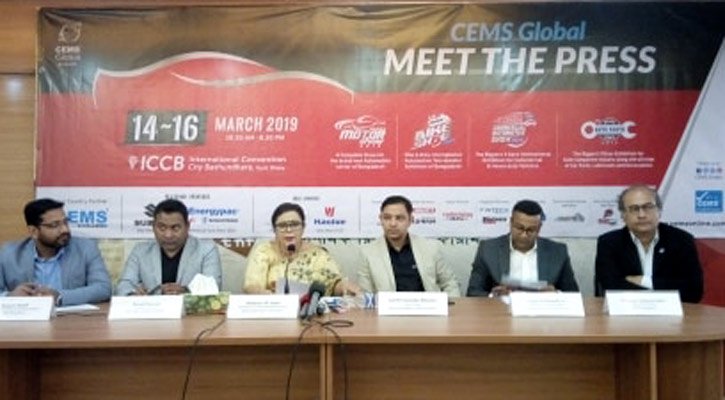Chinese Ambassador to Nepal Hou Yanqi’s meetings with a number of government officials and political party leaders have drawn concerns from political analysts and former diplomats for coming at a time when Nepal’s internal politics is in disarray and political actors are increasingly attempting to gain the upper hand.
Within the last week, Ambassador Hou has met with President Bidya Bhandari and senior Nepal Communist Party (NCP) leader Madhav Kumar Nepal, even as Prime Minister KP Sharma Oli comes under increasing pressure to step down.
As many as 30 of the Nepal Communist party’s 44 Standing Committee members, along with party chair Pushpa Kamal Dahal and senior leaders Nepal, Jhala Nath Khanal and Bamdev Gautam, on June 30 asked Oli to step down as both party chair and prime minister.
Hou met with Bhandari on Friday, July 3, as part of a regular courtesy call, said an aide to the President.
“When a diplomat seeks to meet with the President, we cannot say no,” the aide told the Post. “We do not know why the President’s meetings with party leaders and ambassadors are dragged into controversy.”
Questions have already been raised over the role that Bhandari has continued to play in the ruling communist party, especially when tensions boil over between the two party chairs Oli and Dahal. On Thursday, after meeting with Bhandari, Oli prorogued the Parliament and adopted a more combative stance against his opponents.
Bhandari’s meeting with the Chinese ambassador only raises more questions, especially since officials at the Foreign Ministry told the Post that the President’s Office has been repeatedly violating the diplomatic code of conduct.
An under-secretary from the Ministry of Foreign Affairs is posted at the President’s Office to brief the President on potential meetings with foreign dignitaries and ambassadors, but the under-secretary was not informed about the meeting between Bhandari and Hou, according to a ministry official.
“As per the diplomatic code of conduct, Foreign Ministry officials should be present at such meetings, but we were not informed,” the ministry official told the Post on condition of anonymity. “So there is no institutional record of the meetings and we don’t know what the talking points were.”
Again, on Sunday evening, Ambassador Hou held a meeting with Madhav Nepal, who is also head of the Nepal Communist Party’s Foreign Relations Department. The two discussed the ongoing conflict within the ruling party where Hou urged all conflicting sides to maintain restraint, according to sources familiar with the meeting.
Bishnu Rijal, deputy chief of the Foreign Relations Department, confirmed the meeting but was unable to provide details.
“I don’t have details about the meeting between Nepal and ambassador Hou but as far as I understand Chinese protocol, the Chinese begin meeting top ranking officials and gradually come down to other officials,” said Rijal, implying that Hou should have already met with the two party chairs before meeting Nepal.
According to party officials, Hou reportedly met with Oli before the commencement of the party’s Standing Committee meeting, which began on June 24. She has also been seeking a meeting with Dahal but has not had any luck so far, said a leader close to Dahal.
On Monday evening, Ambassador Hou met with senior leader Jhala Nath Khanal at his residence, again discussing internal power politics, according to an aide to Khanal.
Insiders say that the Chinese envoy has been advising party leaders to remain united, as Beijing is concerned about “political stability” in Nepal.
Hou made a similar circuit in the first week of May, when disputes had emerged within the Nepal Communist Party. Meeting with Oli, Dahal, Nepal and other senior party leaders, Hou had then too advised party unity.
When asked about the objective of Hou’s meetings, Chinese Embassy spokesperson Zhang Si told the Post that China did not wish to see the Nepal Communist Party in trouble and wished that leaders would resolve their differences and stay united.
“The embassy keeps good relationships with Nepali leaders and is ready to exchange views on issues of common interest at any convenient time,” said Zhang.
The ambassador–and the embassy–keeps good relationships with the government, political parties, think tanks and all walks of life in Nepal, and always exchanges views on issues of common concern at convenient times, said Zhang.
Foreign affairs analysts, however, have not taken too kindly to the Chinese envoy making the rounds, especially at a time of crisis within the ruling party.
“I blame our leaders for inviting interference in our internal affairs,” Lokraj Baral, a former ambassador, said. “Earlier, the Indian ambassadors would involve themselves in our internal affairs, and now it is the Chinese’s turn.”
Baral also pointed out the changing facets of Nepal’s relationship with both countries, where India is viewed with more suspicion than China.
“When the Indian ambassadors did the same thing, we called it interference,” he said. “But the same does not apply to the Chinese. Only the media have raised this issue, but the political leadership and public intellectuals have not thought about it that way.”
Party leaders, however, strongly rejected speculations in the media that Chinese envoy was interfering in Nepal’s internal matters.
“We strongly refute all conspiracy theories that the internal political dynamics in our country, even today, are directed by this or that foreign force,” party spokesperson Narayan Kaji Shrestha, who is also a former foreign minister, said on social media. “Nepal as a sovereign country is able to decide for itself. We object to and reject any tendency to intervene in our affairs.”
It was Shrestha, during his tenure as foreign minister in 2011-12, who raised the issue of unscheduled meetings by ambassadors and diplomats with government officials without the knowledge of the Foreign Ministry.
Shrestha had enforced the diplomatic code of conduct and advised all government officials and political leadership to adhere to it.
Despite Shrestha’s vociferous refutation, there is no denying that the ruling Nepal Communist Party has cultivated a close relationship with China and the Chinese Communist Party, strengthening ties and increasing bilateral visits.
A month ahead of President Xi Jinping’s visit to Nepal in October, the Nepal Communist Party organised a symposium on Xi Jinping Thought and invited Chinese Communist Party leaders to share the doctrine with over 200 of its party members.
Though there were concerns over whether Beijing was exporting its political doctrine to Nepal—or the Nepal Communist Party was trying to emulate the Chinese Communist Party, leaders had said that it was just a “knowledge-sharing” exercise.
More recently, the Nepal Communist Party and the Chinese Communist Party held a virtual interaction and Nepal, as a member of the UN Human Rights Council, voted in favour of a controversial Chinese security law regarding Hong Kong.
Given the spectre of foreign interference in Nepal, which has actively been cultivated by Nepal’s own leaders over the years, it is only natural for the media and citizens to speculate, said former officials.
“Prime Minister Oli says the Indian ambassador is actively attempting to topple his government while on the other hand, the Chinese ambassador is going door-to-door to save the government,” said former foreign minister Kamal Thapa on social media, referring to Oli’s recent comments that plots were being hatched in New Delhi and Kathmandu by India to topple his government.
Although there is speculation that China is now more active in Nepal’s internal politics, analysts are firm on the belief that foreign actors should stay out of Nepal’s internal matters.
“How long can the party sustain an artificial unity promoted by a foreign envoy anyway?” said Baral, who is also a professor of political science at Tribhuvan University. “Why don’t political parties, through their institutional mechanism, take a decision on their own? The present discord inside the ruling party may end on a give-and-take but who will guarantee that it will not resurface after some months?”
Writer Anil Giri is a reporter covering diplomacy, international relations and national politics for The Kathmandu Post. Giri has been working as a journalist for a decade-and-a-half, contributing to numerous national and international media outlets






















